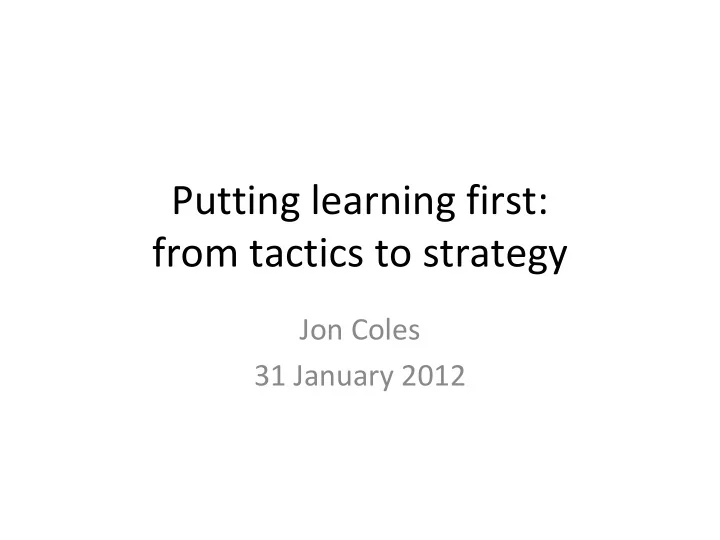

Putting learning first: from tactics to strategy Jon Coles 31 January 2012
An indefensibly brief and partial summary of the history of this area of policy High accountability ERA a moment of Can we create a system discontinuity: then which retains NC, SATs, Ofsted, accountability but performance tables, increases trust and floor targets reduces perverse centrality of govt incentives? Low High trust trust Period of growing Post war settlement: demand for education, qualifications for the curriculum innovation, minority; universities in RoSLA, mode 3 CSE. William charge; education a Tyndale, Rising Hill, Black Papers, minor govt dept Ruskin College speech Low accountability
Accountability and its effects • We should welcome accountability as a positive good, not a necessary evil – but whether we do or not, we should accept that there is no going back on data transparency • The question for school is how best to respond • For schools in challenging circumstances, the floor targets not the E ‐ Bacc dominate thinking • We have seen in challenging schools the rise of an increasing range of tactics for raising attainment. For example: – Curriculum change in KS4 – Tracking and borderline target groups – ‘The marriage of English and maths’ – Early entry and repeated entry – 3 year KS3 – ‘Short, fat’ and ‘long, thin’ GCSEs
Understanding tactics • There is nothing wrong in principle with having tactics – they are necessary for any strategy; equally, if they improve the attainment of pupils, they are valuable in their own right • But we should understand whether tactics are: – Merely tactical : tactics which have no purpose except league tables. E.g. repeatedly rehearsing KS2 papers and then doing no Eng or ma post ‐ SATs; entering a whole cohort for BTEC science – Motivational : tactics which improve league table position but also raise students’ engagement with other things. E.g. entering students for qualifications with little intrinsic market value in order to raise motivation to succeed elsewhere – Progression ‐ focused : tactics which raise league table position by giving students opportunities to progress further than they would have done otherwise. E.g. the ‘as far as possible’ curriculum; an alternative approach to early entry?
From tactics to strategy • If learning is more important than ever, if every child can succeed and if ours is a moral calling, then this must underpin our approach • We do want every child to achieve good qualifications: our strategy must be to ensure that children get good qualifications because they have learned what is most important to them • Schools should seek to avoid ‘mere tactics’ and focus their efforts on the progression ‐ focused: – Literacy and numeracy from the start – A focus on teaching and learning – Authentic and deep subject teaching – ‘As far as possible’ curriculum – Depth and rigour of vocational teaching, linked to real labour market conditions and to employers – Rigorous, progression ‐ focused tracking and support of every student underpinned by a deep conviction in the possibility of success of every student – Qualification entry strategies and teaching of exam technique in the service of this
Awarding bodies • AB incentives both structure and are structured by school incentives • There is a need to break out of the current paradigm: – Loosening the grip of assessment theory – Validity before reliability – Sampling from domains, not 100% coverage of specifications – Reducing predictability – Retaining conceptual depth above procedural accuracy – An end to current marketing strategies • An act of moral courage, to match that of schools
Policy makers • How best to create a framework which retains appropriate focus on labour market ‐ recognised qualifications, but rewards deep learning? • Some components: – Performance table qualifying and equivalents in the right direction today – Sharp content specification for every GCSE – Regulation of ABs which rewards ‘bar ‐ raising’ and de ‐ accredits qualifications. No iteration in qualification approval – Progression measures to the fore – Serious attention to teaching and learning • The 2013 and 2015 raising of the participation age provide us with the opportunity to re ‐ think this system: – What should someone educated to 18 have? – What breadth, what depth, what other experiences? – Focus on outcomes not just the ‘outputs of the system’
Recommend
More recommend